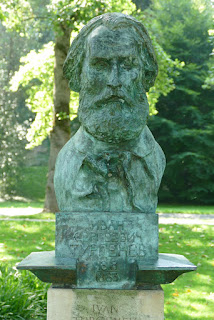 |
| Turgenev memorial in Baden-Baden |
Not even a day after my last post, I must add an addendum. I went to midtown today and stopped at the Graduate Center of CUNY for an event. The GC once had a German program, but no more, but there is still the same collection of books as when I was there writing my dissertation on Goethe. So, before the event, I browsed and came across The Russian Image of Goethe by André von Gronicka, the second volume of which concerns the second half of the 19th century. The volume opens with the chapter "I.S. Turgenev: A Study in Ambivalence." We learn from the start that Turgenev was accomplished in the German language, learning it already as a child with tutors, and the most knowledgeable of all Russians in German philosophy and letters. Turgenev even visited Weimar, where he was disappointed in Goethe's domestic taste. He was a visitor at the salon of Bettina von Arnim who, according to von Gronicka, was “the eloquent transmitter of G’s pantheistic world view which so enraptured young Turgenev.” His letters are replete with Goethe references and quotations. Of the Roman Elegies he wrote: “What life, what passion, what vitality breathe in these verses. Goethe in Rome, in the embrace of a Roman woman."
A.N. Wilson, in the review I discussed in my previous post, mentions that Turgenev's greatest work was in his profound insights into nature, "not in the novels where he regurgitated what he had read in western newspapers about his country." In this connection, von Gronicka mentions Turgenev's studies at the universities in Moscow, Saint Petersburg, and Berlin in the years 1833 to 1843, from which he emerged confirmed in his "Westernism." In an autobiographical sketch, Turgenev himself wrote of his stay in Berlin: "I threw myself headfirst into the German sea ... and when I finally surfaced from its waves I reappeared as a 'Westerner' and have always remained one."
Turgenev spent seven years in Baden-Baden in the late 1860s to be with the famous soprano Pauline Viardot, where he also wrote the novels Smoke, Ghost, and The Dog. There were also other Russians there, including Tolstoy, who had a passion for roulette.


No comments:
Post a Comment